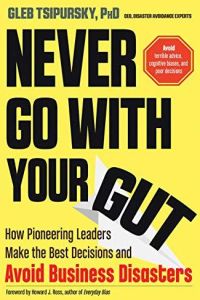Many experts tout the benefits of using your instincts in business. But behavioral economist and Disaster Avoidance Experts CEO Gleb Tsipursky disagrees. You can make better decisions without tapping your instincts, he says, because – regardless of the decision – cognitive biases get in the way. To help you reach better-informed decisions, Tsipursky has compiled a menu of mental biases, as well as methods to counter those judgment errors, most of which will already be familiar. While Tsipursky’s prose is repetitive at times, it hammers home the steps required to combat human mental shortcuts.
Avoid allowing your fight-flight-freeze instincts to inform your business decisions.
If a saber-toothed tiger is chasing you, you should follow your gut. In business, however, making decisions that you base on your intuition can spell disaster. When Elon Musk tweeted a comment that contained a cryptic reference to marijuana while discussing Tesla’s stock sale, the SEC fined both Musk and Tesla $20 million, and the lapse in judgment cost Musk his position as chairman of Tesla’s board.
You can gain a competitive advantage by learning to avoid acting purely on your intuition. Take a methodical approach to your decision making: Recognize the need for a decision. Collect information to garner an informed point of view. Consider what outcome you wish to achieve, establish criteria to help you assess all your options, and conceive solutions that will help you reach your desired outcomes. Evaluate all your options and select the best one. Execute your chosen solution, and assess and tweak it. Consider what information you might have omitted and what biases you hold. Think about what an independent observer might recommend. Ask whether you have identified all the weaknesses...
Former Ohio State University professor Gleb Tsipursky is an author, speaker and CEO of Disaster Avoidance Experts, a management consultancy.


















Comment on this summary